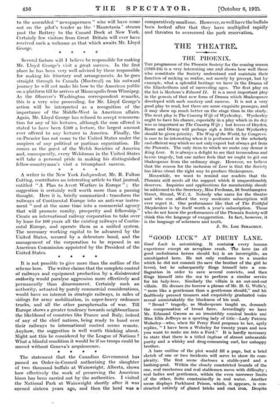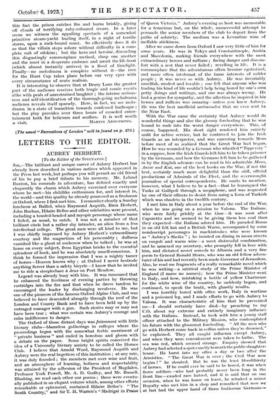"GOOD LUCK" AT DRURY LANE.
Good Luck is astonishing. It contain/ every human experience except an aeroplane crash. The hero (as all good melodrama heroes should be) is an incorrigible, an unmitigated hero. He not only confesses to a murder which he did not commit (to save the brother of the girl he loves), but he subsequently flings himself into a con• flagration in order to save several convicts, and then flings himself into the sea to perform a similar service for his lady-love. Similarly the villain is an out-and-out villain. He dresses (to borrow a phrase of Mr. H. G. Wells's; " more like a gentleman than a gentleman should," and his faultlessly pressed trousers and exquisitely graduated voice reveal unmistakably the blackness of his soul.
" Broad " tragedy, as Shakespeare taught us, demands the compensation of broad farce. Accordingly we have Mr. Edmund Gwenn as an irresistibly comical bookie and Miss Ellis Jeffreys as a sporting lady of title—Lady Patricia Wolseley—who, when Sir Percy Ford proposes to her, aptly replies, " I have been a Wolseley for twenty years and no you want to make me into a Ford." It is hardly necessary to state that there is a titled ingenue of almost unbearable purity and a whisky and drug-consuming earl, her unhappy brother.
A bare outline of the plot would fill a page, but a brief sketch of one or two incidents will serve to show its com- plexity. The first scene discloses a stable-yard and a bathing-pool. Within the closely constricted bounds of the one, real racehorses and real stablemen move with difficulty ; real- ladies and gentlemen, within the even narrower limits of the other, frolic constrainedly in real water. Another scene displays Parkhurst Prison, which, it appears, is con- structed entirely of glazed bricks and cast iron. Despite
this fact the prison catches fire and burns briskly, giving off clouds of terrifying ruby-coloured steam. In a later scene we witness the appalling spectacle of a somewhat primitive steam-yacht hurling itself, in a night of terrific storm, upon a rock-bound coast. So effectively does it do so that the villain steps ashore without difficulty in a com- plete suit of oilskins; but the hero and heroine, discarding this disgustingly commonplace method, clasp one another and the mast in a desperate embrace and await the life-boat (which almost instantly arrives) in a flood of limelight. Finally—no melodrama is complete without it—the race for the Hunt Cup takes place before our very eyes with every circumstance of acute realism.
It is interesting to 'observe that at Drury Lane the greater part of the audience receives both tragic and comic events alike with peals of unrestrained laughter ; the intense serious- ness and self-identification of the thorough-going melodrama audience reveals itself sparsely. Here, in fact, we see melo- drama in a state of transition towards confessed burlesque ; but the play provides over three hours of crowded enter- tainment both for believers and scoffers. It is well worth











































 Previous page
Previous page